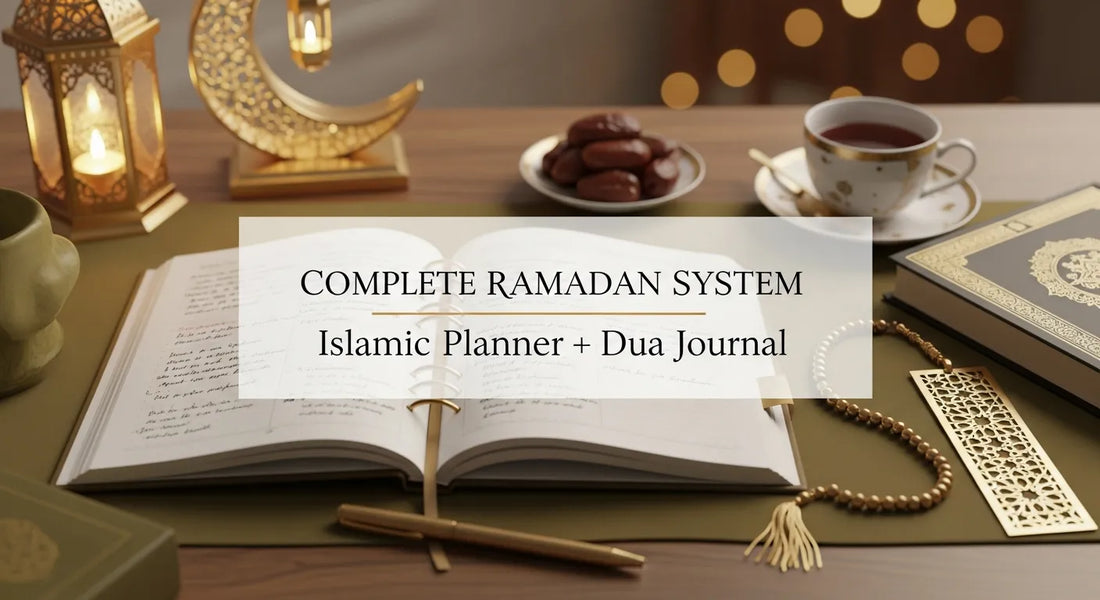Title: Organize Your Life with Faith: The Ultimate Muslim Planner for Daily Success
In today’s fast-paced world, balancing daily responsibilities with spiritual growth can be a real challenge. From work deadlines and family obligations to personal goals and religious commitments, life often feels like a delicate balancing act. For Muslims, staying spiritually connected while managing worldly responsibilities is essential, yet it can be difficult to achieve without a structured approach. This is where a dedicated Muslim planner becomes a valuable tool—a way to harmonize daily tasks with faith-based goals and cultivate intentional living.

A Muslim planner is more than just a notebook or a calendar. It is designed to help you manage your time efficiently while fostering spiritual reflection and growth. By integrating elements like prayer tracking, Qur’an study, goal setting, and personal development, it offers a holistic approach to life management. Whether you are a student, professional, or parent, using such a planner can help ensure that your everyday actions align with your faith.
Why a Muslim Planner Matters
Bridging the Gap Between Daily Life and Spirituality
Many Muslims live busy, multifaceted lives. There are academic or work commitments, family responsibilities, community involvement, and social engagements. On top of that, there is the constant desire to grow spiritually and strengthen one’s relationship with Allah. Traditional planners often focus solely on tasks, appointments, and deadlines, neglecting the spiritual aspects of daily life.
A Muslim planner addresses this gap by combining practical productivity tools with faith-based guidance. It helps users track prayers, set Islamic goals, reflect on the Qur’an, and build habits that enhance both worldly and spiritual growth. By incorporating these features, it reminds you to remain mindful of your intentions and purpose throughout the day.
Making Intentions Visible
In Islam, intention, or niyyah, plays a pivotal role in every action. A planner tailored for Muslims ensures that every task, goal, or commitment is aligned with a higher purpose. Instead of merely completing tasks, the planner encourages you to reflect on why you are doing them. This awareness transforms everyday actions into meaningful steps towards personal and spiritual development.
From Tasks to Habits to Character
Writing down goals is only the first step. True growth comes from transforming these goals into consistent habits that shape character. A Muslim planner supports this process with structured sections for habit tracking, daily reflections, and weekly reviews. Over time, these practices encourage mindfulness, consistency, and alignment between your actions and values.
Key Features to Look For in a Muslim Planner
Flexibility with an Undated Format
An undated planner allows you to start at any point in the year without feeling guilty about unused pages. This is particularly useful for Muslims whose schedules may vary due to Ramadan, Hajj preparations, or other religious events.
Multi-Level Planning: Daily, Weekly, and Monthly
Effective planners provide a layered structure: monthly overviews for big-picture planning, weekly spreads for task prioritization, and daily pages for detailed task management. This approach allows you to set long-term goals while keeping track of day-to-day responsibilities, ensuring that your spiritual practices are seamlessly integrated into your routine.
Spiritual Tracking
A comprehensive Muslim planner includes dedicated sections for prayer times, Qur’an reading, reflection, and acts of kindness. Tracking these elements daily reinforces accountability and encourages consistent spiritual practice.
Goal Setting with Values
The most effective planners guide users to set goals that align with their values. Instead of focusing solely on professional achievements or personal milestones, a Muslim planner encourages you to set objectives that reflect faith, service to others, and character development.
Usability and Durability
A planner’s quality influences its adoption. Features such as premium paper, a durable cover, bookmarks, pen holders, and inner pockets enhance usability and make daily engagement more enjoyable. When a planner is visually appealing and functional, it encourages consistent use.
How to Use a Muslim Planner Effectively
Set Your Vision and Values
Before diving into the planner, take some time to reflect on your life’s purpose and values. Consider questions like: What kind of person do I want to become? How can I align my daily actions with my faith? Use this reflection to outline long-term goals that incorporate both spiritual growth and worldly achievements.
Monthly Planning
At the start of each month, identify key priorities, events, and spiritual objectives. Examples might include completing a certain portion of Qur’an study, participating in community service, or establishing a new habit of consistent prayer. Use this overview to guide weekly and daily planning.
Weekly Planning
Each week, review your goals and break them down into actionable tasks. Schedule your work, study, family time, and community involvement while also allocating time for prayer, Qur’an reading, and reflection. The weekly spread helps maintain a balance between worldly obligations and spiritual commitments.
Daily Check-In and Reflection
Begin each day by listing your top three priorities and reviewing your spiritual goals. At the end of the day, reflect on accomplishments, missed opportunities, and areas for improvement. Journaling in this way fosters mindfulness, self-awareness, and spiritual growth.
Monthly Review and Adjustment
At the end of each month, review your achievements, challenges, and progress towards your goals. Reflect on consistency in prayer, Qur’an study, acts of kindness, and personal development. Use these insights to refine your planning for the following month. This practice mirrors muhasabah, or self-accountability, an essential aspect of personal growth in Islam.
Practical Tips for Different Life Stages
For Students
Block study sessions and Qur’an reading into your weekly schedule.
Track prayers and ensure you maintain consistency, even during busy academic periods.
Include small acts of kindness or volunteer work to integrate service with your studies.
Use monthly reviews to evaluate both academic progress and spiritual growth.
For Working Professionals
Plan time for prayers during work hours and set reminders for spiritual activities.
Incorporate mentorship, community service, or faith-based learning into your weekly schedule.
Reflect on how your professional actions align with Islamic values.
Use the planner to balance deadlines and personal growth initiatives.
For Parents
Coordinate family prayers and Qur’an reading sessions
Schedule community service or charitable activities as a family.
Include lessons in Islamic values for children or engage in joint reflection sessions.
Use the planner to manage both household responsibilities and spiritual objectives.
For Those in Transition
Whether starting a new job, moving, or preparing for Hajj or Umrah, use the planner to map out steps, reflect on priorities, and adjust daily routines.
Treat planner use as a ritual to ensure consistent reflection and goal-setting.
Overcoming Common Planning Challenges
Lack of Consistency
Consistency is key. Commit to using the planner daily for at least 30 days. Start and end your day with short sessions of planning and reflection.
Feeling Overwhelmed
An undated planner allows flexibility. Skip days when necessary and use only the sections relevant to your current needs.
Losing Track of Spiritual Goals
Dedicated sections for prayer, Qur’an, and reflection help keep spiritual objectives visible. Regularly revisit these sections to ensure alignment with faith-based intentions.
Not Seeing Immediate Results
Growth takes time. Celebrate small wins and maintain a monthly review habit. Over weeks and months, these practices cumulatively lead to significant spiritual and personal development.
Real-Life Applications
Student Example: A university student balances coursework with Qur’an memorization and volunteer work. Using a planner, the student tracks prayer times, study sessions, and reflection prompts, adjusting routines to maintain balance.
Professional Example: A working professional schedules tasks while integrating service, mentorship, and spiritual reflection into the week. Daily and weekly reviews ensure alignment with personal and faith-driven goals.
Parent Example: A parent coordinates family prayer, Qur’an study, and community involvement using the planner, ensuring that the family grows together in both faith and character.
These examples highlight how a planner can transform daily routines from reactive task management to purposeful, faith-aligned living.
Building a Habit and Lifestyle Around Planning
Morning Routine: Begin each day by reviewing the planner, listing priorities, and setting a spiritual intention.
Evening Reflection: End the day with reflection on achievements, missed opportunities, and improvements for tomorrow.
Weekly Review: Analyze accomplishments, challenges, and areas for improvement to adjust plans accordingly.
Monthly Goal-Setting: Reassess long-term objectives, aligning them with evolving priorities, seasonal events, or spiritual milestones
Consistency and intentional use of the planner turn it into a powerful tool for life management and spiritual growth.

Expected Benefits
Clarity and Focus: Organize tasks and spiritual goals for a structured, balanced life.
Alignment with Values: Daily actions reflect faith and ethical principles.
Consistency in Habits: Track and maintain spiritual practices effectively.
Enhanced Mindfulness: Regular reflection increases self-awareness and purposeful living.
Holistic Growth: Integrates personal, professional, and spiritual development.
Peace of Mind: Creates a sense of control and intentionality over life choices.
Conclusion
A Muslim planner is more than just a scheduling tool; it is a companion for intentional living. It bridges the gap between worldly responsibilities and spiritual growth, helping you organize, reflect, and align your actions with Islamic principles. By using a planner consistently, you transform busy routines into a meaningful journey of faith, service, and personal development.
Whether you are a student, professional, parent, or someone in transition, incorporating a Muslim planner into your daily life ensures that your actions are not only productive but purposeful. It fosters habits that build character, nurture spiritual growth, and lead to a more intentional and balanced life.
Embrace the practice of mindful planning today, and turn your daily schedule into a roadmap for both worldly success and spiritual fulfillment.